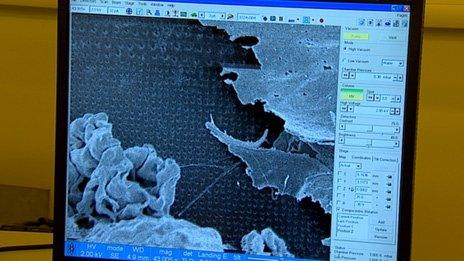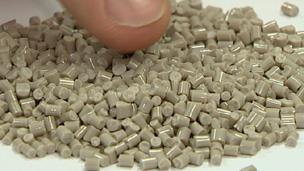'Nano pit' technique to extend life of hip replacements
- Published

The problem with hip replacements is that they do not last forever
A Scottish team of biologists, nanoengineers and surgeons has come up with a new technique which could mean hip replacements that last a lifetime.
The researchers want to coat key surfaces with a "nanopattern" pitted plastic to encourage stem cells to form bone in contact with the new joint.
The system aims to combat problems with the body forming soft tissues around hip replacements.
Work is under way to develop prototype devices over the coming years.
It's the potential solution to a problem which faces everyone who gets a new hip - it won't stay new.
You'll be lucky to get 15 years out of it before your hip replacement needs to be replaced.
Consultant orthopaedic surgeon Dominic Meek, from Glasgow's Southern General Hospital, said the hip replacement procedure had become a victim of its own success.
"One of the problems is that it's been so successful that we've been putting them into a lot more, younger patients - and they're a lot more active," he said.
"So because of this they've been wearing out these hip joints."
Add to that the fact that the implants can become loose.
That happens because over the years stem cells in the patient's bone marrow surround the implant with soft tissue.
Our bodies' stem cells have the capacity to differentiate - to transform into any other kind of cell. But soft tissue around an implant means it starts to lose its grip.
If the stem cells could be encouraged to form bone instead, it would create a joint fit for a lifetime.
Which is where the Glasgow University team came in.

The pitted nanopattern influences biological development on a microscopic level
Their solution is a nanopattern - a pattern so small even the most powerful optical microscope can't see it. The individual photons in light are just too big and clumsy.
An electronic microscope can make it out as an array of tiny pits just 120 billionths of a metre across.
When the stem cells meet one particular nanopattern, something amazing happens. Instead of soft tissue, bone grows.
"What we've done is control the pattern that we have to tell the stem cells what tissue we want them to form," said cell biologist Dr Matthew Dalby.
"And by tuning the pattern we can tell the stem cells around the implant that we want them to form bone.
"So now we've made the basic biological discoveries we now want to turn this into a real orthopaedic device that Dominic can get excited about and trial with his patients."
The next step is to coat the key surfaces of an implant with the nanopattern. Biomedical engineer Dr Nikolaj Gadegaard showed me the material they're using for that.
As he pours the granules onto his desk, it's hard to not be a little underwhelmed. They're a rather uninspiring khaki colour, although that's hardly the point.
The plastic is strong, doesn't interact with a patient's body chemistry, and doesn't get in the way of X-Rays.

The raw materials for the new technique don't look like much
It's called polyether ether ketone - PEEK for short.
And Dr Gadegaard said PEEK's key property was that it could be shaped to include the tiny pits of the bone-growing nanopattern.
"They are a thousand times smaller than the diameter of a human hair," he said.
The team is working with biomedical supplies manufacturer Invibio as they move towards creating a new kind of implant.
The process has already taken three years. Five or even 10 more could pass before it moves from the laboratory to the operating theatre.
But if successful it won't just be dodgy hips that stand to benefit. Knees and shoulders would also be in line for the technique.
The nanopattern may also have applications in new drugs to fight osteoporosis.
But for starters, the team will be happy to create a new hip that stays new.
- Published4 March 2012
- Published7 December 2011